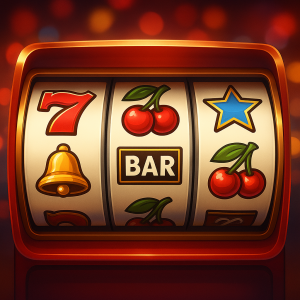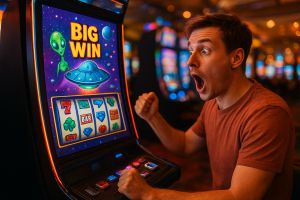The Birth of Slot Machines: The Mechanical Reels Era
The Liberty Bell: The First True Slot Machine
The origins of slot machines trace back to the late 19th century. In 1891, Sittman and Pitt, a New York-based company, developed a poker-based gambling machine featuring five drums and 50 playing cards. However, it lacked an automatic payout system, so winnings were manually awarded by bartenders.
The first true slot machine capable of dispensing coins was created in 1895 by Charles Fey, a mechanic from San Francisco. Named the Liberty Bell, this machine featured three reels with five symbols: horseshoes, diamonds, spades, hearts, and the Liberty Bell itself. Landing three Liberty Bells in a row resulted in the highest payout—50 cents, which was a significant sum at the time. This simple yet effective design set the foundation for the slot machines we know today.
The Rise of Mechanical Slots
Following the success of the Liberty Bell, similar machines began appearing in bars and casinos across the country. Players would insert a coin, pull the lever, and watch the reels spin, hoping for a winning combination.
Slot machine technology advanced significantly in 1963 when Bally introduced Money Honey, the first fully electromechanical slot machine. This innovation allowed for larger jackpots, improved sound effects, and flashing lights, making the experience more engaging. Despite these advancements, slot machines remained relatively unchanged until the dawn of the digital era in the 1980s.
The Digital Revolution: The Emergence of Video Slots
The Birth of Video Slots
The introduction of video slot machines in the 1980s marked a new era for gambling. Bally once again led the way, releasing The Fortune Coin in 1976—the first video slot. Unlike mechanical slots, this game used a video screen instead of physical reels, opening the door for more dynamic and visually appealing designs.
By the 1990s, video slots had become mainstream thanks to advancements in computer graphics and game mechanics. International Game Technology (IGT) launched Megabucks in 1986, introducing progressive jackpots that could grow to life-changing sums. This innovation laid the groundwork for the massive jackpot slots seen in today’s online casinos.
The Transition to Online Slots
The rise of the internet in the late 1990s and early 2000s paved the way for online casinos. Digital slot machines, powered by software rather than physical hardware, revolutionized the industry. Players could now enjoy slots from the comfort of their homes, with games featuring elaborate themes, bonus rounds, and interactive elements.
Online slots quickly outpaced traditional machines in popularity, thanks to features like free spins, multi-reel gameplay, and progressive jackpots that could reach millions of dollars. Developers also embraced pop culture, designing slots inspired by movies, TV shows, and beloved classic themes.
The Modern Era: Mobile Gaming and Virtual Reality Slots
The Mobile Slots Boom
With the explosion of smartphone usage in the 2010s, mobile slots became a dominant force in online gaming. Developers optimized games for touchscreens, ensuring smooth gameplay on both smartphones and tablets. Mobile slots now offer the same thrilling experience as desktop versions, allowing players to spin the reels anytime, anywhere.
The Future: Virtual Reality and Beyond
Looking ahead, slot machines are poised to integrate cutting-edge technologies like Virtual Reality (VR) and Augmented Reality (AR). Some developers have already begun experimenting with VR slots, creating immersive 3D casino environments where players can interact with the game in a whole new way.
AR technology also presents exciting possibilities. Imagine pointing your phone at a physical slot machine and seeing additional stats, animations, or interactive elements come to life on your screen.
While VR and AR slots are still in their infancy, they represent the next evolution in slot gaming, promising deeper immersion and new ways for players to engage with their favorite games.
FAQ
Q: When were slot machines invented?
A: Slot machines date back to the late 19th century, with Charles Fey’s Liberty Bell emerging in 1895 as the first coin-operated slot machine.
Q:. How do mechanical slot machines work?
A: Mechanical slots use physical reels with symbols. Players pull a lever, spinning the reels. If symbols align in a winning combination, the machine dispenses a payout.
Q: What was the first video slot machine?
A: The first video slot machine, The Fortune Coin, debuted in 1976 and replaced traditional mechanical reels with a digital screen.
Q: How did online slots originate?
A: Online slots emerged in the mid-1990s alongside the rise of internet casinos. These games were powered by software and offered innovative features like progressive jackpots and bonus rounds.
Q: Are mobile slots different from online slots?
A: Mobile slots are a subset of online slots designed for smartphones and tablets. They offer the same features but are optimized for touchscreen controls and smaller screens.
Q: What is a progressive jackpot?
A: A progressive jackpot increases over time as players make bets. A portion of each wager contributes to the prize pool, which continues to grow until a lucky player wins.
Q: Will slot machines continue to evolve?
A: Yes! The future of slots includes VR, AR, and AI-driven personalization, creating even more immersive and engaging experiences.
Q: How do online slots ensure fair play?
A: Online slots use Random Number Generators (RNGs) to guarantee that each spin is random and independent, ensuring fair gameplay.
Q: Can I win real money playing online slots?
A: Yes! Many licensed online casinos offer real-money slots with significant payout potential, but remember—winning is based on luck.
Q: How do video slots differ from mechanical slots?
A: Mechanical slots use physical reels, while video slots use digital screens to display animations, bonus rounds, and themed graphics.
Conclusion
Slot machines have come a long way, evolving from simple mechanical devices to sophisticated digital experiences. With technological advancements shaping the future of gaming, the thrill of slot machines continues to grow. Whether you prefer the nostalgia of classic reels or the immersive world of VR slots, one thing is clear—slot machines will keep evolving, offering bigger thrills and even greater innovations for years to come.












